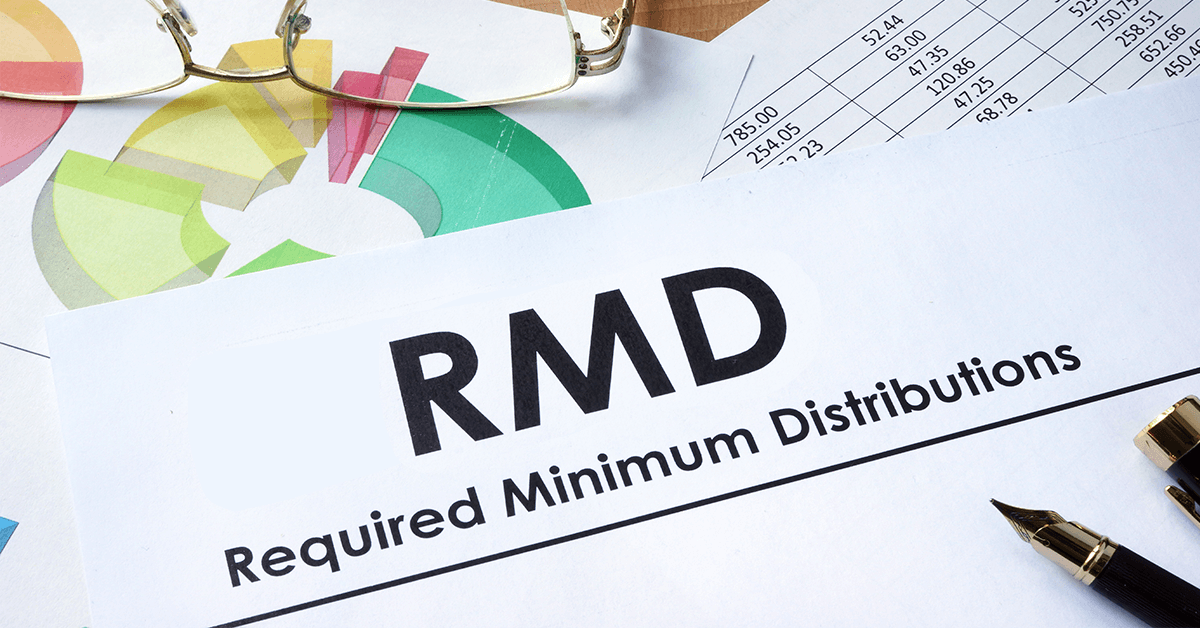|
What Is a Required Minimum Distribution (RMD)?
A required minimum distribution (RMD) is the amount of money that must be withdrawn from an employer-sponsored retirement plan, traditional IRA, SEP, or SIMPLE individual retirement account (IRA) by owners and qualified retirement plan participants of retirement age. You must begin withdrawing from a retirement account by April 1 following the year account holders reach age 73. The retiree must then withdraw the RMD amount each subsequent year based on the current RMD calculation. KEY TAKEAWAYS
Understanding Required Minimum Distribution (RMD)
A required minimum distribution (RMD) acts as a safeguard against people using a retirement account to avoid paying taxes. Required minimum distributions are determined by dividing the retirement account’s prior year-end fair market value (FMV) by the applicable distribution period or life expectancy. The Internal Revenue Service (IRS) has a worksheet to help taxpayers calculate the amount they must withdraw. Generally, your account custodian or plan administrator will calculate these amounts and report them to the IRS. Some qualified plans allow certain participants to defer the start of their RMDs until they actually retire, even if they are older than age 73. Qualified plan participants should check with their employers to determine whether they are eligible for this deferral. It should be noted that while an account holder must withdraw the required minimum distribution amount, they can also withdraw above that amount. If the account holder wants to withdraw 100% of the account in the first year, that’s perfectly legal, but the tax bill could be a shocker. The RMD rules do not apply to Roth IRAs while the owner is still alive. However, the RMD rules do apply to Roth 401(k) accounts. It should be noted that while an account holder must withdraw the required minimum distribution amount, they can also withdraw above that amount. If the account holder wants to withdraw 100% of the account in the first year, that’s perfectly legal, but the tax bill could be a shocker.
Please know that we do not offer any form of tax or legal advice. You should seek out a qualified advisor for these types of questions. This information above is for educational purposes only.
|
|
CLICK TO READ OUR FULL DISCLOSURE
The information contained herein: (1) is proprietary to Birdseye Financial Group and/or its content providers; (2) may not be copied or distributed; and (3) is not warranted to be accurate, complete, or timely. Any information herein about providers, speakers, and services does not constitute a recommendation or endorsement. This material is not to be distributed without the express written consent of Birdseye Financial. Regarding your financial situation, you should consult with a financial professional before acting on specific actions or suggestions given. For legal or tax advice, you should contact your qualified attorney or CPA. Insurance and tax planning services are offered through Birdseye Financial. Investing involves risk, including the potential loss of principal. No market investment strategy can guarantee a profit or protect against loss during declining values. Fiduciary Investment Advisory Services are offered through LifePro Asset Management, an SEC-Registered Investment Advisor. Registration does not denote any level of skill or qualification.
MEDICARE MANDATORY DISCLAIMER
“We may not offer every plan available in your area. Please get in touch with Medicare.gov, 1-800-MEDICARE, or your local State Health Insurance Program (SHIP) to get information on all your options.” All calls regarding Medicare may be recorded by phone or online and a SCOPE of appointment required by Medicare will be obtained 48 hours before any sales meeting to discuss plan details. (NOTE - The organizations and plans can vary by state and county, we can validate these numbers upon request.)
State Licenses
LICENSES: AZ #7101306, CA #4140429, FL #W825259, GA #3621424, ID #863617, KS #7101306, MA #2176921, NV#3879853, NC #7101306, OK #3001663224, OR #7101306, TX #2695866, WA #190780. Note that in California, our DBA is Birdseye Financial and Insurance Services. The current license status may increase or decrease without being updated on this site. If you have any questions, please don't hesitate to ask.ve any questions, please don't hesitate to ask.
The information contained herein: (1) is proprietary to Birdseye Financial Group and/or its content providers; (2) may not be copied or distributed; and (3) is not warranted to be accurate, complete, or timely. Any information herein about providers, speakers, and services does not constitute a recommendation or endorsement. This material is not to be distributed without the express written consent of Birdseye Financial. Regarding your financial situation, you should consult with a financial professional before acting on specific actions or suggestions given. For legal or tax advice, you should contact your qualified attorney or CPA. Insurance and tax planning services are offered through Birdseye Financial. Investing involves risk, including the potential loss of principal. No market investment strategy can guarantee a profit or protect against loss during declining values. Fiduciary Investment Advisory Services are offered through LifePro Asset Management, an SEC-Registered Investment Advisor. Registration does not denote any level of skill or qualification.
MEDICARE MANDATORY DISCLAIMER
“We may not offer every plan available in your area. Please get in touch with Medicare.gov, 1-800-MEDICARE, or your local State Health Insurance Program (SHIP) to get information on all your options.” All calls regarding Medicare may be recorded by phone or online and a SCOPE of appointment required by Medicare will be obtained 48 hours before any sales meeting to discuss plan details. (NOTE - The organizations and plans can vary by state and county, we can validate these numbers upon request.)
State Licenses
LICENSES: AZ #7101306, CA #4140429, FL #W825259, GA #3621424, ID #863617, KS #7101306, MA #2176921, NV#3879853, NC #7101306, OK #3001663224, OR #7101306, TX #2695866, WA #190780. Note that in California, our DBA is Birdseye Financial and Insurance Services. The current license status may increase or decrease without being updated on this site. If you have any questions, please don't hesitate to ask.ve any questions, please don't hesitate to ask.











